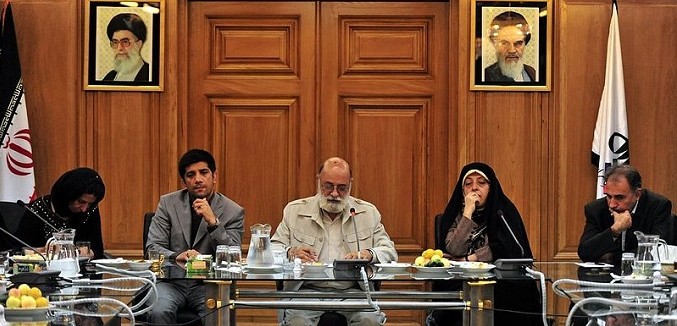Iran’s parliament has begun formally debating the proposed cabinet of Iranian president Hassan Rouhani, with a vote of confidence expected to come later this week.
For their part, Western analysts are scrutinizing Rouhani’s cabinet picks for signals as to what policies a Rouhani administration is likely to pursue. A policy brief published last week by the Foundation for Defense of Democracies (FDD) described the proposed cabinet of a power struggle between Iran’s Ministry of Intelligence and National Security (MOIS) and the Islamic Revolutionary Guards Corps. The number of cabinet officials drawn from MOIS is, according to FDD Senior Fellow Ali Alfoneh, unprecedented in the country’s history:
As illustrated by the graph below, the strong technocratic presence in Rouhani’s proposed cabinet follows a general trend since the founding of the Islamic Republic in 1979. A relatively strong MOIS presence, however, is unprecedented. So is the sharp drop in IRGC presence. This shift could be a sign of increased struggle for power between the strongest security arms of the regime. The number of MOIS veterans Rouhani has proposed for his cabinet roughly equals the total number of MOIS officials who have served as cabinet ministers in the entire history of the Islamic Republic. Indeed, since its formal establishment in 1984, only five MOIS veterans have been cabinet members.
Rouhani himself spent decades in top posts within Iran’s security establishment and is considered to be a consumate regime insider who spent decades in top posts within Iran’s security establishment. suggests that the cabinet’s composition can be read as part
Concerns have been raised over several candidates.
Rouhani’s proposed foreign minister, Mohammad Javad Zarif, has been blasted for minimizing the Holocaust.
The proposed justice minister, Mullah Pour-Mohammadi, has been accused by opposition groups of playing a central role in campaigns of mass murder.
The proposed intelligence minister, Seyed Mahmoud Alavi was previously appointed to a top post by Iranian Supreme Leader Ayatollah Ali Khamenei. Alavi last fall gave a speech in which he celebrated Iran’s “culture of martydom” and declared that Tehran would “never back down against the arrogance. Wall Street Journal Assistant Books Editor Sohrab Ahmari, a Farsi speaker and Iran expert, notes that the latter phrase is regime shorthand for the United States and its allies. Ahmari also describes a TV appearance by Alavi in which he described the terror groups Hezbollah and Hamas as Iran’s “pupils” and boasted that “Americans can’t even take on” the groups.
[Photo: Hamed Saber / Wiki Commons]




